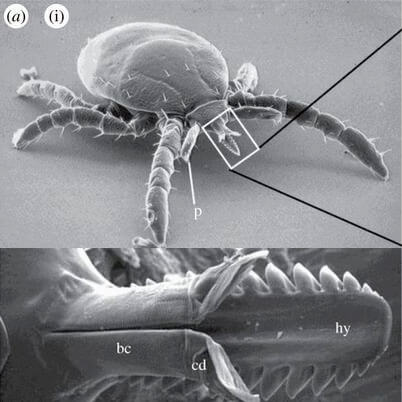News
Seen through a microscope, the mouth of a tick offers fodder for nightmares. For Harvard professor L. Mahadevan, it also offers a great subject for mathematical and physical study. (Image courtesy of L. Mahadevan and the Royal Society.)
James Gorman writes the following in the New York Times...
Chain saws, hockey masks and the undead are all classic symbols of horror. But for a true shiver of dread, take a look at a tick.
When seen with an electron microscope, a tick’s mouth has what look like twin saws (chelicerae) flanking an appendage (a hypostome) that appears to be the kind of long, barbed sword that a villain in a video game might favor.
And a short video is even scarier — particularly as the creature’s ability to bore down and settle in may well afflict anyone who spends time outdoors.
Read the entire article—and watch the video, if you dare
"Hypostomal envelopment"
A research video demonstrates how the tick uses a ratchet-like appendage and motions like a swimmer's breaststroke to puncture and latch on to its host's skin. (Video courtesy of L. Mahadevan and the Royal Society.)
Topics: Applied Physics, Applied Mathematics
Cutting-edge science delivered direct to your inbox.
Join the Harvard SEAS mailing list.



